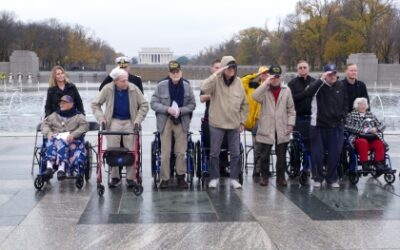All World War II veterans now are eligible for no-cost VA healthcare, medical services and nursing home care, the VA announced shortly before Veterans Day.
New Factbook Reveals Veteran Trends, Including Mental Health, Labor Market
U.S. military veterans are declining as a percentage of the population and are, on average, older, more likely to be male and less racially or ethnically diverse than the overall nonveteran population, reports a new factbook that sheds light on demographics, mental health and labor market outcomes.
Surgery Is Better Treatment for Primary Aldosteronism
Even though primary aldosteronism (PA) is one of the most common causes of secondary hypertension, the comparative outcomes of targeted treatment often are unclear.
Consensus Documents Answers Some Questions on Carotid Stenosis
Many national/international guidelines provide recommendations on management of patients with asymptomatic (AsxCS) and symptomatic (SxCS) carotid stenosis. Several questions remain unanswered, however, according to a new report.
SMART2 CABG Risk Score Performs Well in Racially Diverse VA Cohort
A new study tested the potential of the Secondary Manifestations of Arterial Disease (SMART2) risk score for use in patients undergoing coronary artery bypass grafting (CABG).
Fate of VA’s Whistleblower Protection Office Under Legislative Discussion
Should VA’s Office of Accountability and Whistleblower Protection (OAWP) be given more authority in order to better conduct investigations and track enforcement recommendations, or should it be done away with entirely?
Psychedelics to Treat PTSD Now Getting Bipartisan Congressional Support
After decades of being considered fringe science by lawmakers, research into psychedelics for the treatment of post-traumatic stress disorder (PTSD) is finding bipartisan support in Congress.
VA’s Research Portfolio Suffers From Lack of Focus, Critics Maintain
VA’s research portfolio has slowly but steadily grown larger year after year. Nearly every major piece of legislation impacting VA includes provisions requiring the department to conduct research, whether it be on toxic exposure, mental health, suicide or other high-profile issues affecting veterans’ health.
VA Will Fund Medical Residencies in Underserved Areas Across the United States
In an effort to improve healthcare access for veterans in rural, trial and underserved areas across the United States, the VA is creating a new pilot program for graduate medical education.
Thyroid Cancer More Common Among Transgender Female Veterans
Transgender female veterans appear to have a high prevalence of thyroid cancer, according to a recent study that might be the first to demonstrate such a disparity in that cohort.
MHS Patients Receive Earlier Cancer Diagnoses Than General U.S. Population
Cancer patients treated within the MHS generally receive their diagnoses earlier than members of the general U.S. population covered by employee-provided insurance, Medicaid or without insurance.
Apixaban Suggested as Better OAC for Frail Older Adults With AF
Past research has suggested that elderly veterans who are frail are less likely to be prescribed oral anticoagulants for atrial fibrillation (AF). A recent study suggested a possible way to mitigate some of those challenges.
Usability Testing to Identify Deficiencies, Improve Efficiency in EHR Transition
For healthcare systems changing over from one electronic health record (EHR) system to another—such as the VA’s transition from its legacy EHR system to Oracle Cerner EHR modernization program—the transition poses many challenges, including an impact on medication safety.
Healthcare Facilities Must Be Prepared to Handle Simultaneous Stressors
Healthcare systems are often required to navigate external stressors, such as policy changes, natural disasters and emerging infectious diseases, which can disrupt patient care.
VA Celebrates 20 Years of Telehealth With Continued Expansion of Services
The VA launched its national telehealth services program in 2003. Twenty years later, it continues to look for new ways to break down barriers to care and expand services available to veterans from the comfort of their homes by tapping into services offered by industry leaders as well as developing internal capabilities.
Unstable Housing Increases Veterans’ Mortality Risk With Kidney Dialysis
Unstable housing appears to contribute to socioeconomic disparities in mortality among U.S. veterans receiving dialysis, with older adults being especially vulnerable, according to a new study
MGUS Higher in Servicemembers, No Association Seen With Burn Pit Exposure
Individuals who have served in the U.S. military have about three times the risk of monoclonal gammopathy of undetermined significance (MGUS) as a similarly aged cohort in the Icelandic iStopMM study.
Mental Health Issues Increase Mortality in Some Veterans With AML
Venetoclax combinations are common treatments for individuals with acute myeloid leukemia (AML) who are unable to withstand the rigors of intensive induction chemotherapy.
BTK Inhibitors Provide Option for CLL Patients With Severe Renal Dysfunction
BTK inhibitors have proven to be a powerful tool in CLL treatment and have replaced chemoimmunotherapy as the preferred first-line treatment.
Evaluate Veterans With MGUS for Cardiovascular Disease
Monoclonal gammopathy of undetermined significance (MGUS) is not considered a hematological condition of concern, yet it is associated with lower overall survival. VA researchers led by Lawrence Liu, MD, of the St. Louis VAMC, explored whether the reduced life expectancy arose from an increased risk of cardiovascular events.
Deployment Linked to Longer Survival in Servicemembers, Veterans With NHL
A study presented at the 2023 ASH Conference, provided additional evidence for the healthy deployer effect, this time in individuals with non-Hodkin lymphoma.
Which Veterans Should Undergo SPEP Testing for Plasma Cell Dyscrasia?
Plasma cell dyscrasia affects up to 5% of adults. While often asymptomatic, its characteristic clonal expansion of bone marrow plasma cells can also indicate the presence of several hematological malignancies including multiple myeloma.
GLP-1 Use Reduces Risk of MGUS Progression in Some Veterans
Glucagon-like peptide 1 (GLP-1) receptor agonists have gained huge popularity as they have demonstrated the ability to substantially reduce both blood-glucose levels and weight. In addition, recent research suggests cardiovascular and renal benefits to their use in certain populations.
Agent Orange Increases CVD Risk in Veterans With Myeloproliferative Neoplasms
As Vietnam-era veterans move into the age range in which most myeloproliferative neoplasms (MPNs) develop, the VA has a keen interest in fully understanding the full impact of exposure to Agent Orange in veterans with these malignancies.
McDonough: VA Can Only Be So Competitive in Physician Salaries
For many high-demand medical professions, VA will likely never be able to fully compete with the private sector, regardless of the breadth of benefits the department can offer, according to VA Secretary Denis McDonough.
Million Veteran Program Study Pinpoints Concerns About Cannabis-Use Disorder
A study using data from the VA’s Million Veteran Program raised serious concerns about risks associated with cannabis use.
New Strategic Lab Director Fosters Disruptive Technologies, Seeks Growth
As the executive director of VA’s brand-new Strategic Initiatives Lab (Strat Lab), it is the mission of Anne Lord Bailey, PharmD, BCPS, to encourage VA to play the long shots.
Problems Persist for Servicemembers Transitioning to VA Services
When the required transition classes prior to discharge from the military are delayed, servicemembers might not be aware enough about VA healthcare and benefits. That can affect their ability to undertake a smooth transition to civilian life.
Not Just a Bulging Belly: DRA Causes Problems for Military Women
Diastasis recti abdominis (DRA) is a common condition in pregnant and postpartum women, occurring when the rectus abdominis muscles, commonly called the six-pack ab muscles, separate from being stretched.
Concerns Raised About ‘Buggy’ Website; VA’s Dependence on It
VA’s main website, va.gov, and several of its support systems have been the victim of bugs that have caused tens of thousands of VA benefits claims to go unprocessed.





